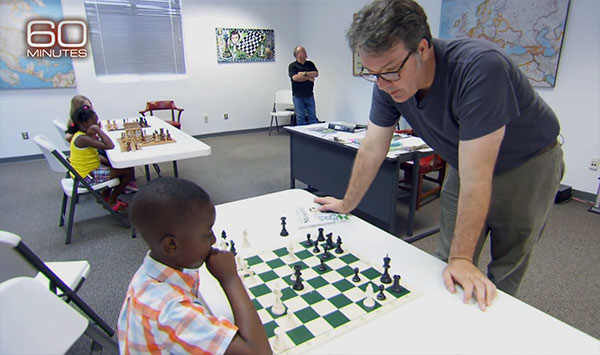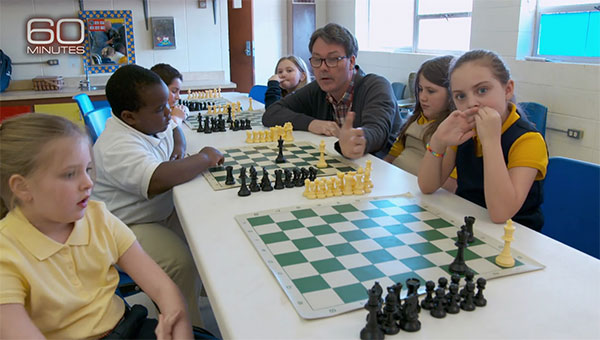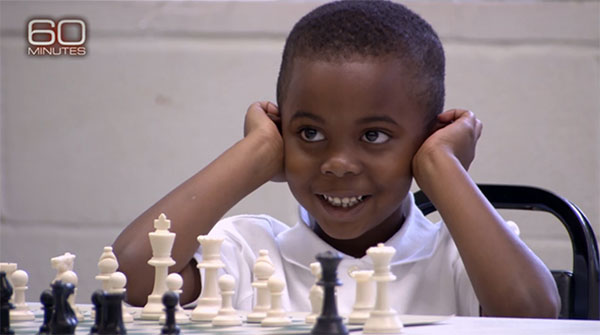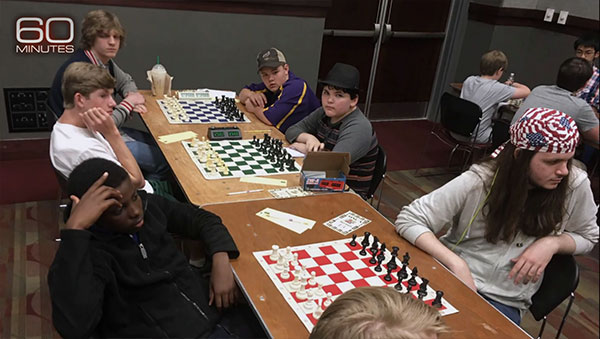The population of Franklin County is around 7,000. Because of today’s U.S. chess scene, chess success in a lightly-populated area is possible. This article discusses how what happened earlier this century may have influenced chess blossoming in Franklin County, MS.
The 60 Minutes segment showed the grand opening of a chess center in the middle of Meadville, MS (population 450). But Meadville is not the first small town to open a chess center and garner national media attention. At the beginning of this century, Lindsborg, Kansas, had a population of 3,300. One of its residents, Russian immigrant Mikhail Korenman, made the town “crazy for the game of chess” according to a National Geographic article. Soon after, Anatoly Karpov opened one of his chess schools in Lindsborg. Although Korenman moved to Chicago in January of 2006, the Anatoly Karpov School of Chess continues to operate in its building on the main street of town. The school will run a chess camp this summer featuring Grandmaster Timur Gareyev as lead instructor.
Full 60 Minutes report
[The full transcription and video can be seen at the official website, and requires a CBS All Access subscription.]
60 Minutes journalist Sharyn Alfonsi asked, “Can the best chess player in the world come from Franklin County?” The Mississippi chess children answered in the affirmative. And, based on what has happened in Kansas, they may be right. Grandmasters can come from states with small populations. Via email, Grandmaster Conrad Holt wrote, “As far as I know I’m the only GM or IM from Kansas. It’s always very important for the aspiring players to have local tournament options. I have played in the Lindsborg Open, the Kansas Open, and other tournaments at the chess school site or elsewhere in Lindsborg.” Holt won the 2008 U.S. Cadet held at the Anatoly Karpov School of Chess.

According to the 60 Minutes report, last year only seven of the 93 graduates from Franklin County High School went on to a four-year college. But every chess player that the 60 Minutes reporters spoke to plans to attend college someday. One reason that the Mississippi chess children may be considering college is because of full-ride scholarships for chess. Although partial chess scholarships had been offered, the rivalry between The University of Maryland, Baltimore County and The University of Texas at Dallas at the turn of this century was the start of full-ride scholarships for chess. “Full-ride” means four years of tuition, fees, books, and room and board. In other words, a “full ride” makes a four-year college education free of charge for academically-qualified chess players. As those two universities alternated winning the Pan American Intercollegiate Team Chess Championship, they received positive media attention and attracted top scholar-chess players as students. Other universities noticed. Following the lead of UMBC and UT Dallas, several universities now offer full-ride scholarships to chess players. Even students that don’t expect a full-ride are influenced by the media attention garnered by college chess programs.

Additionally, Grandmaster Susan Polgar of Webster University (currently the top college chess team) has personally influenced chess teacher Jeff Bulington. He emailed, “I have learned from Susan Polgar’s methods of chess instruction.” He also lists Grandmaster Sam Palatnik and FIDE master Loren Schmidt as influences. About Schmidt, Bulington emailed, “Loren’s analysis of the fundamental role a diverse community’s feedback plays in the acquisition of chess skill is central to my understanding and practice of teaching chess.” About the 60 Minutes story on Bulington, Loren Schmidt posted on Facebook, “I’ve known Jeff since he was a kid in Indiana and I was a young master (and chess teacher) completing my doctorate at Purdue University. I later had the pleasure of serving on his doctoral committee at Purdue.”

That Schmidt served on a doctoral committee for Bulington’s dissertation about chess also shows that chess has become a legitimate dissertation topic at top U.S. universities. When I was a nine-year-old child in Lincoln, NE, Loren Schmidt, then an undergraduate at the University of Nebraska-Lincoln, was my chess teacher. Much later, as a graduate student at the University of California, Los Angeles, I wanted to write my dissertation about chess and curriculum. My chair thought that there was not enough chess curricula or chess research for the required “literature review” section. So my doctoral dissertation (1999) was not on chess.

By 2006, ABC-CLIO had published my first book Children and Chess: A Guide for Educators (dedicated to Dr. Loren Schmidt and to Dr. Tim Redman, founder of the afore-mentioned UT Dallas chess program). ABC-CLIO published my next four books, also on chess and curriculum, between 2008 and 2011. With the combination of my books and more research about the cognitive effects of chess, perhaps professors of education at Purdue in 2012 (the year Bulington completed his Ph.D.) were more favorably inclined toward “chess in curriculum” as a dissertation topic than my education professors were in 1999. Bulington’s dissertation is Class at Play: A Schoolteacher's Narrative of Chess, Curriculum, and Social Mobility.
Last, and perhaps most important, a wealthy benefactor funding chess in MS has an obvious counterpart in how benefactor Rex Sinquefield has transformed chess, schools, and culture in St. Louis. That story has been told in many places so I won’t recap it here. However, the idea of chess as a worthy recipient for benefactors’ largesse is one that bodes well for the future of chess.



























